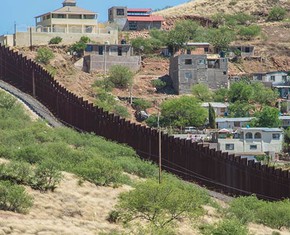The views expressed in our content reflect individual perspectives and do not represent the authoritative views of the Baha'i Faith.
Why did so many people, including my parents and their crazy hippie friends, become Baha’is during the peace and love era of the sixties?
For the people who became seekers and then members of the Baha’i Faith during that tumultuous time, several teachings of this young religion magnetized and energized their hearts and minds.
The revolutionary writings of Baha’u’llah addressed the largest social problems of the day, bristling with relevancy. When I say the word “revolutionary,” I don’t throw that word around lightly. I mean, imagine it: the idea that a nineteenth century Persian nobleman could address difficult societal issues that even now, in 2017, are still at the cutting edge?
That’s truly astonishing.
For instance, the rights of women and girls. Perhaps you’re aware of the current state of the status and rights of women in much of the Muslim world. In some places females aren’t allowed to drive, to travel without a male relative as a chaperone, even to go out in public alone. Marriages are arranged and the state of women is often similar to that of a household slave. Women can be beaten pretty much whenever the husband wants, and stoned or killed if there’s the possibility of the slightest impropriety to the family. Can you imagine how infinitely worse it must have been in the mid-1800s? Then, women were treated like animals. Men had multiple wives and the women had no rights, no say in their lives whatsoever. They were traded like mules.
In the midst of this environment, Baha’u’llah taught that women are equal to men in every way, have the same rights and should be empowered through education. Even more, he claimed that humanity would never achieve its potential and maturity unless women are honored and accorded the same rights as men:
… there are no acceptable grounds—biological, social or moral—to justify denying women full equality with men, and girls equal educational opportunities with boys. – The Universal House of Justice, April 2002, To the World’s Religious Leaders, pp. 2-3.
Although Iran is bit more progressive when it comes to women than some other Muslim countries, people who fight for the emancipation of women there in 2017 are basically silenced and imprisoned. Imagine the response in the 1860s.
As a matter of fact, the first woman to remove her veil as a protest against Muslim cultural beliefs about women was an early follower and friend of Baha’u’llah, a renowned poetess named Tahirih—an acclaimed theologian who turned down a marriage proposal from the Shah himself. A renowned writer whose poetry is still beloved in Iran, she was barred from ever seeing her children and kept under house arrest by her husband and uncle. She was reviled by the Muslim and government authorities, banished to various places around Persia and had rocks thrown at her wherever she went.
Before she was strangled with her own scarf and her body thrown in a well with stones heaped upon it, she famously proclaimed to the world the clarion call of “You can kill me as soon as you like, but you can not stop the emancipation of women!” All this was happening at the exact same time as the first-ever women’s suffrage conference in Seneca Falls, New York. In fact, Tahirih may have been the world’s first modern feminist martyr.
Baha’u’llah taught the elimination of racial prejudice and the importance of social justice during a time when the brown and black races were considered literally less than human, and slavery was being practiced in every corner of the world:
All prejudices, whether of religion, race, politics or nation, must be renounced, for these prejudices have caused the world’s sickness. It is a grave malady which, unless arrested, is capable of causing the destruction of the whole human race. Every ruinous war, with its terrible bloodshed and misery, has been caused by one or other of these prejudices.
The deplorable wars going on in these days are caused by the fanatical religious hatred of one people for another, or the prejudices of race or colour.
Until all these barriers erected by prejudice are swept away, it is not possible for humanity to be at peace. For this reason Baha’u’llah has said, “These Prejudices are destructive to mankind.” – Abdu’l-Baha, Paris Talks, pp. 146-147.
In fact, as a Persian nobleman, the first thing Baha’u’llah did when he inherited his father’s estate was to free all the slaves. This was unheard of at the time. Revolutionary. The concept that we were all members of one global human family, regardless of our race or class was preposterous back then. The idea that all human beings had rights under God, and that they were equal in his sight no matter what their race or class was revolting, shocking and outrageous. For millions around the globe, it’s still threatening today. Even (especially!) here in the United States.
The social teachings of Baha’u’llah truly resonated with the impassioned youth of the late sixties. The ideas that we needed to eliminate the extremes of wealth and poverty, and that education was the key to mining the potential of the human race, had been heard before—but never posited as spiritual truths and religious teachings and applied so universally. Certainly others over the centuries had spoken of racial harmony, women’s equality, social justice and education—but no one ever explored these ideas in the context of a divine revelation, incorporated in religious faith and a greater service to the world, a revelation that had been given to help guide humanity to its inevitable spiritual maturation.
What Baha’u’llah offered was a cause, a mission, a new way of seeing the world and changing it. It wasn’t simply “another religion.” In fact, it was a revolution as well as a revelation.
















Comments
Sign in or create an account
Continue with Googleor